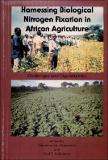| dc.contributor.author | Liya, S.M. | |
| dc.contributor.author | Agboola, A.A. | |
| dc.contributor.author | Odu, C.T.I. | |
| dc.date.accessioned | 2015-07-10T08:52:14Z | |
| dc.date.available | 2015-07-10T08:52:14Z | |
| dc.date.issued | 1998 | |
| dc.identifier.citation | Liya, S.M., Agboola, A.A., & Odu, C.T.I. (1998) Feedback Inhibition of Nitrogen Fixation by Plant and Environmental Factors in Mpepereki, S.M. & Makonese, F.T. (eds.) Harnessing Biological Nitrogen Fixation in African Agriculture : Challenges and Opportunities : Sixth International Conference of the African Association for Biological Nitrogen Fixation, 12-17 September, 1994, Harare, Zimbabwe : selected papers, UZ, Mt. Pleasant, Harare: UZ Publications, pp. 55-64. | en |
| dc.identifier.isbn | 0908307586 | |
| dc.identifier.uri | https://opendocs.ids.ac.uk/opendocs/handle/20.500.12413/6538 | |
| dc.description | A book chapter on nitrogen fixation by plant and environmental factors. | en |
| dc.description.abstract | A literature review provides evidence that legumes have greater requirements for water and nutrients, and are more sensitive to toxicities of Mn and A1 than non-legumes. Furthermore, legumes are more exigent when fixing N2, than when using nitrogen in the soil solution, although certain species and varieties of nitrogen-fixing legumes are less sensitive to stress than others. When a large proportion of the nitrogen assimilated is derived from symbiotic nitrogen fixation, the legume’s ability to procure water and nutrients may be reduced for three reasons; poor root growth, a changed cation-anion balance within the plant and acidification of the rhizosphere. It is therefore postulated that, in the field, nitrogen fixation is subject to a series of feedback-inhibition mechanisms, probably controlled chiefly by the hormone abscissic acid (ABA). Nitrogen fixation causes the plant to grow faster, and increases the need for nutrients and water. When any one becomes deficient, ABA is produced, which promotes nodule senescence at concentrations which stimulate fine root growth. If the fine roots find another source of the limiting factor, nitrogen fixation will resume. Such cyclic processess have been documented for water stress. They may also occur due to nutrient deficiencies and to rhizosphere acidification in acid soils. One consequence of feedback inhibition is that legumes can only derive a high proportion of their nitrogen from fixation when conditions for growth are good. When growth conditions are poor, for instance in drought-prone kaolinitic soils low in organic matter, nodulation will be rare. Legume varieties should be selected and bred (in combination with suitable root nodule bacteria) for greater symbiotic activity under such conditions. Cultural practices can also reduce stress, e.g. the addition of crop residues and other plant material to acid soils. | en |
| dc.description.sponsorship | ACFD,the EU,FAO,IAEA,ISF,IESCO,CTA,Rockefeller Foundation,UNEP. | en |
| dc.language.iso | en | en |
| dc.publisher | University of Zimbabwe (UZ) Publications. (Department of Soil Sciences) | en |
| dc.rights.uri | http://creativecommons.org/licenses/by-nc-nd/3.0/ | en |
| dc.subject | Agriculture | en |
| dc.subject | Environment | en |
| dc.subject | Technology | en |
| dc.title | Feedback Inhibition of Nitrogen Fixation by Plant and Environmental Factors | en |
| dc.type | Book chapter | en |
| dc.type | Conference paper | en |
| dc.rights.holder | University of Zimbabwe (UZ) | en |


